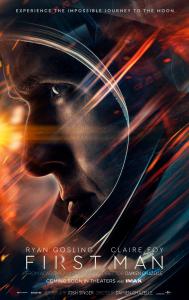By Christian Hamaker
The heavens declare the glory of God; the skies proclaim the work of his hands.—Psalm 19:1
Early in director Damien Chazelle’s First Man, the story of Neil Armstrong’s journey to becoming the first man to walk on the moon, we hear a reporter ask the astronaut about an early journey into orbit, “Did you feel closer to God than at other times?”
The question elicited a chuckle among the preview audience watching the film in 2018, but such a query underscores the sense of wonder that First Man conveys in its best moments. The film says little explicitly about faith, but its majestic footage of space travel can be awe-inspiring when it isn’t terrifying.

Armstrong (Ryan Gosling), training as part of NASA’s Gemini program, lives in Texas with his wife (Claire Foy) and family, as well as with the haunting memories of a daughter, Karen, who died very young. He’s both part of an elite group of men, training for the physical and mental rigors of space travel, and a stereotypical 1960s dad, working hard while his wife stays in their modest home with the kids. Armstrong will have a beer with co-workers, but his interior life is a mystery even to those closest to him. His religious ideas are similarly opaque. Beyond a brief response to a question about answered prayer, we don’t know much about Armstrong’s commitment to anything beyond NASA and his country. When memories of his deceased daughter overcome him, he retreats physically (to his backyard), barking at a colleague (Jason Clark) who tries to approach him.
Displays of emotion in First Man are clipped and infrequent, but the film’s emotional tone matches the reserve of its title character. Even after hearing of the deaths of fellow Apollo astronauts Gus Grissom (Shea Whigham), Ed White (Clarke) and Roger Chaffee (Corey Michael Smith) during a preflight test at Cape Canaveral, Armstrong is mostly stoic. He saves the bulk of his grieving for Karen, whose memory follows Armstrong beyond the bounds of Earth.
The film works well in those quieter moments, but it makes an even stronger impression during its scenes of flight. Chazelle puts us in the flying machines alongside Armstrong, and the shaking, deafening trips beyond Earth’s atmosphere and into zero gravity are both exhilarating and exhausting. The sound and fury contrast effectively with the serene quiet of space and the surface of the moon.
So what’s missing? First Man doesn’t tee up the stand-and-cheer moments you might expect. It’s not a rousing crowd-pleaser with moments designed for an audience to burst into applause. Nor does the film include much humor, which may be just as well: Some of its most exasperating moments come at the expense of Buzz Aldrin (Corey Stoll), who’s made to look like a bit of a blowhard. That’s a surprise considering the cultural reverence Aldrin has earned later in his life (including a star on the Hollywood Walk of Fame).
The film’s depiction of Aldrin is also as close as First Man comes to cynicism in depicting its characters, although the film doesn’t put a glow on everything about the era of the Apollo program. We hear skeptical comments from those who opposed the costs of our race to beat the Soviets to the moon, and a musical performance of Gil Scott-Heron’s Whitey on the Moon points to the racial turmoil of the late 1960s. Still, such moments are few and far between. First Man does little more than nod at the strife of that cultural moment, choosing instead to focus on one man’s dedication and diligence in fulfilling President John F. Kennedy’s 1961 directive to put a man on the moon by the end of the decade.
Chazelle’s film is the sort of sturdy historical drama we don’t see much outside of Oscar season, or, increasingly, even during awards season. It’s an intimate character portrait on a grand scale—told against a backdrop of national greatness and scientific achievement. It’s a period piece that plays like a throwback: the Space Race, America vs. Russia, wood paneling and lots of cigarette smoking—all in service of a tale of triumph for a country that embraced a hero.
Among the strife of today’s politics, First Man is a reminder of what our nation once accomplished—and what it cost, both in money and lives—even as it leaves us wondering if such accomplishments will only be past memories rather than inspiration for future feats. By its conclusion, you may not feel over the moon, but you’ll leave with a greater sense of hope that the nation can achieve things that inspire its people rather than disillusion them.













